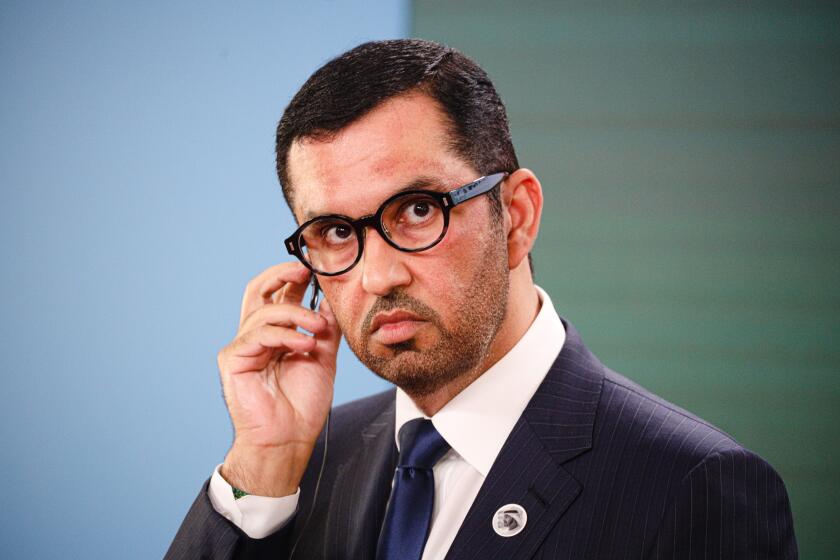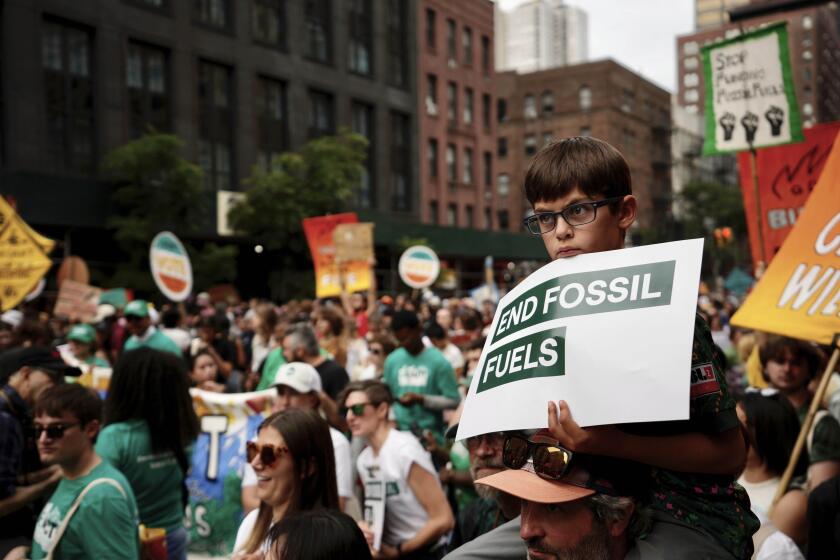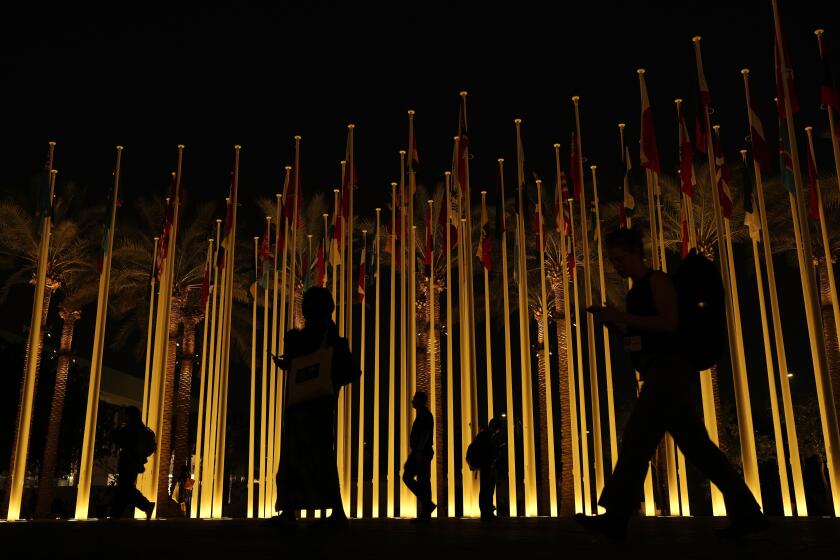COP28 has become a shameless exercise in the fight against climate change. But can we afford to walk out?

- Share via
As the 28th United Nations climate summit (COP28) draws to a close in Dubai, after another year of devastating heat waves, droughts, wildfires, storms and record high global temperatures, the entire process is threatening to break down. Not only has COP28 failed to meet this moment demanding dramatic and immediate climate action — it has made a caricature of it.
The fact that the U.N. chose a petro-state, the United Arab Emirates, to host COP28 was an ominous sign to begin with. And the UAE’s appointment of a fossil fuel executive, Sultan Al Jaber, to preside as COP28 president made matters worse.
Yes, we should engage oil and gas producers in the global effort to avert climate catastrophe, and perhaps the offer to host the summit was intended as a carrot to encourage them to join rather than obstruct progress. But if the olive branch was offered in good faith, it was cynically turned into a fig leaf to conceal the naked, shameful ambition of Big Oil to increase its planetary rampage.
Editorial: An oil executive’s going to host the U.N. climate summit. It shows who’s really in charge
Climate activists and politicians have likened the decision to letting arms dealers lead peace talks or putting a tobacco CEO in charge of health policy.
Right out of the gate there were disturbing signs. Reports indicated that Al Jaber was using his position to promote the UAE’s state oil firm. He also stated in an interview that there is “no science” showing that a phase out of fossil fuels is required to limit warming to 1.5 degrees Celsius (2.7 degrees Fahrenheit), the global target to reduce ever-worsening climate effects. (He says he was misinterpreted, but the recording is quite clear on this point.)
And now the UAE’s petro-state ally Saudi Arabia is not only joining with Russia and China to oppose a “phase out” of fossil fuels; it won’t even agree to much weaker “phase down” language. The international oil cartel OPEC is asking its members to block any deal to curb fossil fuel use. Meanwhile, those seeking to prolong the use of oil and gas are inserting weasel words like “unabated” before fossil fuels as shorthand for the dubious notion that the carbon dioxide in emissions will somehow be “abated” by the pipe dream of massively capturing it in the short time frame necessary.
Finally, almost as if to invite derision, the U.N. has made another petro-state, Azerbaijan, the host for next year’s summit.
As much as we have argued against despair and defeatism, climate activists who have grown skeptical and cynical about the COP framework have every right to be disillusioned with the process. The accusation that it has been co-opted by the fossil fuel industry and become rife with conflicts, corruption and corporate greenwashing is difficult to argue against at this point. The U.N. has largely lost the confidence of youth climate advocates who feel betrayed by what they see as a deck stacked heavily on the side of polluters.
Medicine has conflict of interest policies that, while imperfect, help lessen the influence of industry in putting profits and self-interest over science and health.
Yet we still can’t afford to abandon the entire COP process. Polluters and petro-states would like nothing more because, deeply flawed as COP is, it’s the only existing framework for global climate negotiations.
Two years ago, climate advocates assailed COP26 in Glasgow, Scotland, as a failure midway through the proceedings — but progress ultimately was made, including commitments from countries that could limit warming below 2 degrees Celsius, closer to the 1.5-degree necessity. The next year, the summit in Sharm el-Sheikh, Egypt, at least delivered a “loss and damage” agreement by wealthy industrial countries to provide funds and assistance to the developing world to deal with the devastating consequence of climate change caused primarily by legacy polluters such as the U.S. and European Union.
On its first day, this year’s COP took the next step by establishing the loss and damage fund and securing its first contributions. Eliminating COP would abandon that momentum and effectively be a unilateral disarmament in the battle to preserve a livable climate.
So, what do we do?
Climate negotiators at a United Nations conference try to get strongest agreements out of nations on reducing fossil fuels in a dangerously warming planet.
Mend it, don’t end it. We call for a substantial overhaul of the COP rules and processes. It’s almost embarrassing to have to explicitly state, for example, that petro-states — those whose economies heavily depend on the extraction and export of oil and gas — should not be allowed to host the meeting. Given the enormous conflict of interest, oil industry executives should not be allowed to heavily influence, much less preside over, the summit.
The weak COP sauce of “name and shame” — publicly exposing and condemning those standing in the way of climate action — is failing, because the bad actors appear to have no shame. There must be financial penalties, such as tariffs or even embargoes, for countries like Saudi Arabia that seek to thwart the global effort to phase out fossil fuels by locking in oil dependency in emerging economies in Africa and Asia. And the COP rules should be changed to allow for a super majority of, say, 75% of nations to approve a decision, rather than the current consensus rules that allow even one holdout to veto any agreement.
These reforms need to happen immediately. The window of opportunity to keep warming below 1.5 degrees Celsius is closing. It will shut tight in a matter of years without rapid and meaningful progress. We must seize this moment to fix the broken COP process and stop the world from barreling down the road to ruin. It’s time to change the rules so we can change the world for the better.
Michael E. Mann is presidential distinguished professor and director of the Center for Science, Sustainability and the Media at the University of Pennsylvania. He is author of the new book “Our Fragile Moment: How Lessons From Earth’s Past Can Help Us Survive the Climate Crisis.” Susan Joy Hassol is the director of Climate Communication. She publishes Quick Facts on the links between climate change and extreme weather and was named Friend of the Planet 2023 for pioneering climate communication over three decades.
More to Read
A cure for the common opinion
Get thought-provoking perspectives with our weekly newsletter.
You may occasionally receive promotional content from the Los Angeles Times.












